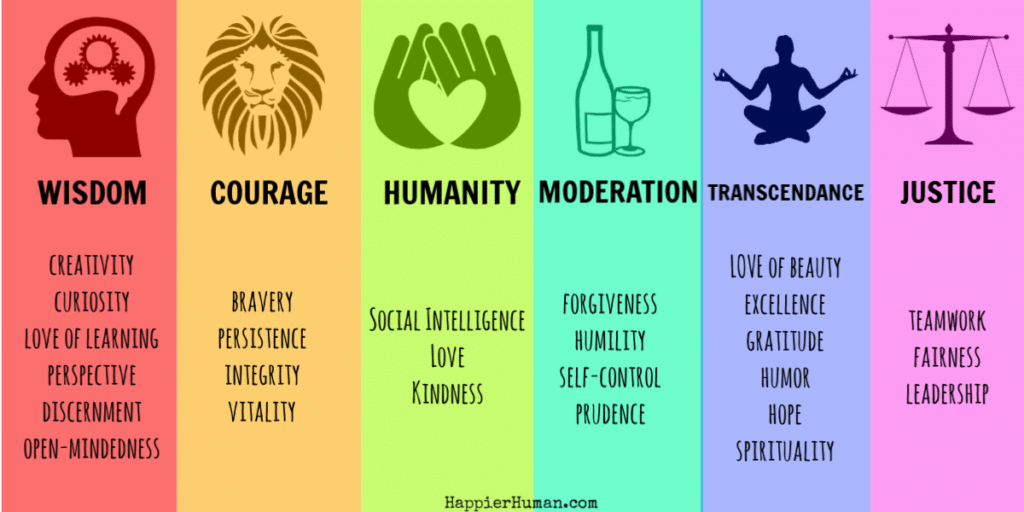There might be affiliate links on this page, which means we get a small commission of anything you buy. As an Amazon Associate we earn from qualifying purchases. Please do your own research before making any online purchase.
Does doing the right thing make you happier?
How do we even know what the “right” thing to actually is, in a world that seems to be slipping further into hatred, mistrust, and apathy on a daily basis?
The answer to these questions might be to look back to the past, rather than forward to the future. Looking at the practical wisdom of the philosopher Aristotle to help us find answers to our current problems.
Want to know the best part?
This practical wisdom might actually increase our happiness.
Aside from Aristotle's practical wisdom, do you know that there are habits that you can apply in your life to raise your levels of happiness? To find out more, I recommend you check out the book Happier Human that reveals the 53 specific, science-backed habits designed to increase your happy state.
In this post, we explore Aristotle's theory of practical wisdom: That people naturally have a moral compass that guides both their thinking and behavior to “do the right thing”. And that following this moral compass leads to greater happiness.
Sounds good, right? I like the sound of it.
But is it true? Let's find out….
Positive Psychology and Practical Wisdom
In psychology the rebirth of the values of practical wisdom from the ancient philosopher's (primarily Aristotle and Thomas Aquinas ) began with the positive psychology movement.
The “father” of this movement is the famous psychologist Dr. Martin Seligman.
Seligman was the creator of many modern theories of psychology, such as learned helplessness.
In 1998 Seligman took over as head of the American Psychiatric Organization (APA). This the first time he began to speak about a combined field of psychology that would measure, not the things that are wrong with people (mental illness and maladaptive behavior) but with attitudes that promote and strengthen what is right with people. This is positive psychology.
In positive psychology, Seligman and other psychologists were able to focus on the effects that improve lives. Positive psychology focuses on things like well-being, positivity, goal setting, achieving flow, optimism, increasing happiness and general Eudaimonia.
Now, I consider myself to be pretty well read guy. But when I first heard the word eudaimonia a few of years ago, I admit I was a bit stumped.
Does doing the right thing make you happier? How do we even know what the “right” thing to actually is, in a world that seems to be slipping further into hatred, mistrust, and apathy on a daily basis?
Eudaimonia, besides being a nifty tongue twister, is a word (and a concept) we have stolen from the ancient Greeks. (Like many of our best ideas.) In a nutshell, the word eudaimonia means happiness. But it is more than that…. it is a state of being that includes complete contentment, spiritual well-being, health, happiness, and prosperity.
I don't know about you, but I will take some eudaimonia over simple happiness any day!
So now you know about Seligman's founding of the field of positive psychology and revival of the concept of eudaimonia. This is our first connection between the practical wisdom of Aristotle and the ancient Greek philosophers and modern day psychology. Let's take a look at the next big thing Seligman did. Which will be another melding of cutting-edge psychology with ancient beliefs.
Character Strengths and Virtues
Not content to simply hint at the virtues of the practical wisdom of the Greeks, in 2004 Seligman and psychologist Christopher Peterson re-kindled the 2000-year-old discussion on virtue. They published the psychology manual Character Strengths and Virtues (CSV), which recommends six virtues and 24 corresponding character strengths.
For example, the virtue of courage is listed, with the strengths of bravery, persistence, integrity, and vitality as its components.
Now let me be clear, this is probably not a book you want to rush out and buy. First of all it is really expensive (Currently 90$ on Amazon for hardcover. 64$ for the kindle version). This is a textbook for psychologists. It is not a fun weekend read to expand your knowledge. The writing is also a bit dry. Although very, very informative.
The CSV is meant to be the positive psychology addendum to the Diagnostic and Statistical Manual of Mental Disorders (DSM-5).
The DSM-5 is a catalog of all problems in psychology. The maladies, mental illness and maladjustments that make people vary from the norm in non-socially acceptable manners.
With the CSV, on the other hand, we get a catalog of mental strengths that can improve the life of an average person. The idea is to get people to overcome not only their disorders but have a way to realize their strengths and increase their potential to thrive in life. It is all about finding that elusive bit of eudaimonia.
What are the Character Strengths and Virtues?
What are the character strengths and virtues that Seligman and Peterson mentioned, you wonder? Don't be impatient. I am getting there, you see: patience is a virtue.
Character Strengths and Virtues List
Wisdom and knowledge
- creativity
- curiosity
- love of learning
- perspective
- discernment
- open-mindedness
Courage
- bravery
- persistence
- integrity
- vitality
Humanity
- Social Intelligence
- Love
- Kindness
Justice
- teamwork
- fairness
- leadership
Moderation
- forgiveness
- humility
- self-control
- prudence
Transcendence
- appreciation of beauty
- excellence
- gratitude
- humor
- hope
- spirituality
Aristotle's view on Practical Wisdom and doing the right thing
So a natural question is how different were Aristotle's views on the practical wisdom of morality from what was written in the CSV in 2004? Well, first we have to get an idea of Aristotle's worldview.
The first thing you need to know is that Aristotle and the Greeks is that they thought there were two types of wisdom. Practical and abstract wisdom.
The difference between these two was important to Aristotle. For example, abstract wisdom regards charity as a virtue. Under abstract virtue you would be virtuous giving two thousand dollars in cash to the first homeless person you see. In spite of the fact that so much money might lead him to drink himself to death.
With practical wisdom you have to not only do the right thing, but use your knowledge and discernment to do it in the right way. In our charity example this might be researching homeless charities to find a reliable one that has good financials and truly makes a positive impact on the lives of the homeless. And of course get a receipt for a tax deduction on your two grand. This is a practical wisdom example of charity.
Aristotle's 6 Steps for Achieving Practical Wisdom
Here is how Aristotle viewed practical wisdom according to authors Barry Schwartz and Ken Sharpe in their excellent book Practical Wisdom: The Right Way to Do the Right Thing
These are the words of Aristotle (channeled through Schwartz and Sharpe)
1. A wise person knows the proper aims of the activity they are engaged in. They want to do the right thing to achieve these aims—wants to meet the needs of the people they are serving.
2. A wise person knows how to improvise, balancing conflicting aims and interpreting rules and principles in light of the particularities of each context.
3. A wise person is perceptive, knows how to read a social context, and knows how to move beyond the black-and-white of rules and see the gray in a situation.
4. A wise person knows how to take on the perspective of another—to see the situation as the other person does and thus to understand how the other person feels. This perspective-taking is what enables a wise person to feel empathy for others and to make decisions that serve the client’s (student’s, patient’s, friend’s) needs.
5. A wise person knows how to make emotion an ally of reason, to rely on emotion to signal what situation calls for and to inform judgment without distorting it. He can feel, intuit, or ‘just know’ what the right thing to do is, enabling him to act quickly when timing matters. His emotions and intuitions are well educated.
6. A wise person is an experienced person. Practical wisdom is a craft and craftsmen are trained by having the right experiences. People learn how to be brave, said Aristotle, by doing brave things. So, too, with honesty, justice, loyalty, caring, listening, and counseling.
With practical wisdom you have to not only do the right thing, but use your knowledge and discernment to do it in the right way.
Practical Wisdom: Artistotle vs. Seligman
Without a framework of practicality, some of Seligman's CSV could be corrupted into a state of too much “virtue for the sake of virtue”.
The difference between Aristotle's approach to virtue and Seligman's approach comes down to their answer to this question: What should be done when virtues are in conflict?
For example, if an insecure friend asks you how she looks before she goes on a date, should you tell her that she looks ugly, fat, and so on, or lie and tell her she looks great? Clearly, this depends on whether she will have the opportunity to improve the way she looks, on whether she is feeling confident and composed or nervous and self-conscious, and on whether this would negatively impact your relationship. The strengths of social intelligence and integrity are in conflict.
Seligman's answer to this question is that if character strengths can be defined from a practical perspective, they will come with a set of circumstances in which it is appropriate to use over another. His book does not support this idea; however, it does mention a new field of survey research that specifically analyzes different character strengths within the context of different psychosocial themes, such as the workplace or a marriage.
Aristotle's answer, is that virtue ethics has two components: the virtues, and a separate master strength of practical wisdom. Practical wisdom helps decide when to use which virtues, and in what amounts.
For example, when seeing a homeless man on the street, should one demonstrate and practice kindness, or prudence? If kindness, how much? Clearly one shouldn't give away their entire fortune, so perhaps a mix of prudence with a slight bit of kindness is in order.
Another example – when a friend asks for special treatment, should you give it to him? Again, the virtue of kindness and love must be balanced against fairness and/or integrity.
It's not clear to me whose approach is superior. If you try to be virtuous and temper it with a bit of common sense, I think you will be better than 99.5% of the people out there.
Practical Wisdom: The Right Way to Do the Right Thing
Earlier I mentioned the CSV. How even though that manual is the core of the positive psychology, it is not a read for the masses. It is dense and designed for use by professionals. Practical Wisdom: The Right Way to Do the Right Thing, by Barry Schwartz and Ken Sharpe is everything that the CSV is not.
It covers some of the same ground as the CSV. How to incorporate virtues and practical wisdom into your life to lead a better existence. Not just for the sake of “doing the right thing”, but for your own sake.
Following the advice of “Practical Wisdom” can actually lead to increased happiness and wellbeing and if we are very lucky to that elusive state of eudiamonia.
This is NOT a textbook for psychologists. It is a book that every professional should read. It should be on a happiness and positive psychology “must read” book list.
Professionals should read this book because it covers common issues that professional work with all the time.
So if you are looking to grow your happiness by incorporating some virtues, I highly recommend you take a look at this book.
Why is this such a good book for professionals you ask? Let me give you a couple of examples in the next section.
Putting the practical in Practical Wisdom into practice
The authors mention two ways in which the modern workplace makes the development of practical wisdom much more difficult (and important) than ever before.
1. Financial Incentivization
There are two ways in which financial incentivization destroys wisdom. First, by prioritizing making money over developing skills and delivering quality service, workers are deprived of the time needed to get to know people and situations well enough to exercise judgement wisely. Second, the motivation to do the right thing gets replaced by the financial incentive to make money. The situation gets worse, because we then need financial incentives to make people do the right thing.
Financial incentivization destroys wisdom by prioritizing making money over developing skills and delivering quality service.
2. Bureaucratization
By forcing down rigid operating procedures, workers loose the autonomy and flexibility needed to personalize and improve their skills and work. More than that; however, taking away autonomy and flexibility is one of the fastest ways to take away a person's motivation. With a person's motivation gone, even more bureaucratization is needed to get workers to do what is wanted.
Implementing a workplace culture that removes these two negative feedback loops is no doubt extremely difficult. It's unlikely we'll see large change in government institutions. However, there is a slowly growing trend in business to decrease bureaucratization. One of two is better than none!
I hope this post has given you a better idea of the basics of positive psychology, the thoughts of Aristotle and Martin Seligman on what constitutes virtues and practical wisdom, and perhaps most importantly another thing to think about as a method to increase your personal happiness and well-being.
If you are interested in other ways of increasing your levels of happiness, check out Happier Human. It features 53 happiness habits backed by science, which you can apply in your life to become happier.







